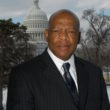Ramsey Clark, former attorney general under Lyndon Baines Johnson and progressive civil rights attorney who ran twice for U.S. Senate from New York, died at 93 in his Manhattan home on April 9, 2021. Mark Green—on the staff of both the 1974 and 1976 campaigns—recalls the experience of trying to combine Clark’s principles with New York politics.
November 5, 1974: We had lost, and we had won. True, incumbent Senator Jacob Javits had prevailed by seven percentage points. But Ramsey had violated all the rules—from doing no polls, imposing a $100 limit on contributions, and mentioning the PLO by name to migrating from Texas to run in New York—and still, he won the primary and scared the arrogance out of the moderate Republican. I thought that his surprising performance could set him up to beat James Buckley, who had won the other New York Senate seat with only 39 percent of the vote in a three-way contest in 1970.
October 19, 1975: U.N. Ambassador Daniel Patrick Moynihan announces on Face the Nation that it would be “dishonorable” to leave the U.N. and run for any office and that, if he did, people should vote against him. (Eight months later, Moynihan declared his candidacy for the 1976 Senate race in New York.)
March 4, 1976: Ramsey, me, and Ken Lerer, the 24-year-old campaign coordinator, meet at Ramsey’s spacious, airy, book-strewn apartment on West 12th Street.
“My announcement on March 15 is fine, but I won’t miss the Brooklyn Law School class I teach that afternoon just to hit a third upstate city. The only reason you say it three times in three places is to get on TV, and after a while people don’t think you’re for real. . . . And no need to list the private organizations I help [e.g., the ACLU, Martin Luther King Memorial] on our campaign literature because it would be exploiting them for self-gain,” he said in his soft-spoken but firm way. “And I’d rather you also not contact Ethel Kennedy, either, because I just asked her to join DISARM [a militant gun-control group] and don’t want to mix the two.”
As his campaign manager, I can’t help but be simultaneously frustrated and charmed by this political paladin.
March 14, 1976: This morning, we arrive at 9:30 a.m. in Syracuse for the Women’s Division meeting of the Democratic State Committee. Each Senate candidate is allowed five minutes for a statement. Ramsey takes 4:05, opens by urging the audience to support Mo Udall for president, and closes with “Vote your conscience and America will be strong.” Representative Bella Abzug, an unannounced but possible opponent, consumes 10 minutes, lists herself as the author of more bills than Sam Rayburn enacted as speaker of the House, and ends with “A stag Senate is a stag-nation.” (On June 28, eight minutes before the filing deadline, Bella officially throws her hat in the ring, giving up a safe House seat to run for Senate. I am disappointed but admire her guts.)
March 25, 1976: I ask Ramsey if he’s made any of his 50 assigned calls for money or endorsements, but he changes the subject, as he often does when I inquire, adding that “people should act out of free will, not because of any outside pressure.” I accuse him of never having accepted the new technology called the telephone. He agrees and laughs. Bella Abzug believes in the telephone.
April 9, 1976: I’m getting criticism from allies about his high-minded, eloquent speeches, like one in which he made sympathetic reference to Black radical Huey Newton. “Mark,” he says (whenever he starts a sentence with my name, I know I’m in trouble). “I’m a free man. You can never let other people tell you what to say, if you believe in what you’re saying. I was just comparing a chapter of Newton’s book that paralleled a passage in Frederick Douglass’s autobiography. Am I not supposed to say that?”
OK, then.
July 8, 1976: About 60 people donate a total of $2,000 at a fund-raising party at Arthur Schlesinger Jr.’s town house. One of Ramsey’s answers in the Q&A session startles some of the guests. He’s asked about the recent Entebbe, Uganda, raid to free Israeli hostages, and the largely Jewish crowd waits for the inevitable answer, which doesn’t come. “It was, of course, a heroic act, but four Israelis died and so did 20 Ugandans. We don’t know if they would have died if there had been negotiations. We do know that violence begets violence. We need a long-range solution, like an International Court of Justice, something I’ve been working on for years.”
July 12–16, 1976: Democratic National Convention week. The floor of the Convention is a carnival—loud, boisterous, other-directed. In short, terra infirma for Ramsey but home turf for Bella. Ramsey sits unobtrusively in the middle of the New York delegation, seeks out no media, and refuses interviews during speeches because, he says, “I’m trying to listen.”
Bella, on the other hand, patrols the aisles, personally hands out campaign buttons, woos celebrities to enlist their support and marches over to every network reporter and camera person she can spot. Coverage of her in New York and nationally is huge.
September 7, 1976: Moynihan and Abzug have been slugging it out in the press—Bella linking him to Nixon (for whom Moynihan worked in the White House) and Moynihan charging her with “McCarthyism.” Their exchanges are mutually demeaning, but they are producing enormous coverage that cements the notion that it’s a two-person race.
In response, Ramsey holds a press conference to contrast their bickering with his substantive campaign. A UPI reporter, indirectly referencing Bella’s public persona, asks Ramsey if people think that he’s a weak leader. Ramsey quietly answers, “You know, people who tell you how tough they are are usually weak. If you’re strong, you don’t talk about it,” and concludes by quoting Carl Sandburg’s famous comment about Lincoln, “Not often in human history does there come a man who is both steel and velvet, as hard as a rock and as soft as drifting now.” The room explodes in applause, and several staff cry.
September 10, 1976: The Gramercy Herald endorses Ramsey . . . and The New York Times endorses Moynihan after Bella refuses to say if she’d endorse Moynihan were he the nominee, which offends the Times’ publisher. Ramsey’s comment on the endorsement: “And I thought that there was some rationality to life.”
September 10, 1976: After a breakfast at the request of two Abzug friends, I report to Ramsey that they and Gloria Steinem had asked me to urge him to drop out of the primary (now only three days away) so his liberal votes would go to Bella, otherwise Moynihan might win. “Mark,” he says, “that would be unprincipled. All our people have worked so hard and deserve us giving ourselves a chance to win. Of course I’d prefer Abzug to Moynihan, but dropping out now would be to manipulate the process.”
When I reported this back to Abzug supporter Dick Aurelio—who had been one of those at the breakfast and would later found NY1—he expressed no surprise. “A campaign’s emotional momentum—fueled by a year of effort, the importance of the goal, the possibility of a miracle, and too little sleep—probably made it impossible to suspend Ramsey’s campaign at this point.”
September 12, 1976: The Times’ Tom Wicker writes a column that eases the pain but not the impact of the paper’s endorsement: Clark’s “been putting forward sensible or at least provocative proposals on an enormous range of issues, avoiding personal attacks, appealing to the common sense and even the idealism of the voters. . . . His reward is that Mr. Moynihan and Mrs. Abzug are the front-runners.”
September 14, 1976: Primary Day! Bad early signs: A cabbie that morning tells me he’s for Moynihan because “Clark dresses like a bum.” At my barbershop that day, a woman stylist says she’ll vote for Bella because “she’s loud, so at least you can hear her. Clark is nice but very quiet.”
Postscript: Moynihan beats Abzug by one point (easily within the margin provided by The New York Times endorsement)—with Ramsey a distant third—and goes on to defeat Buckley and serve four distinguished terms. Ramsey continues his work as a lawyer for so-called “radical” causes and some of the most despised defendants in the world. Abzug blames me the rest of her life for her loss, later failing in comeback bids for mayor and the House. While I’m serving 22 years later, in 1998, as the public advocate for New York City, Moynihan’s wife, Elizabeth, hints that I should consider running to succeed him in 2000 . . . but a former first lady does so instead and gets a hard-earned win.
My three takeaways: I begin to understand better the observation that sometimes in politics you have to rise above principle, that virtue is not always its own reward, and that Ramsey Clark was one of a kind.
Mark Green is the author or editor of 25 books, including Bright Infinite Future, and, with Ralph Nader, Wrecking America: How Trump’s Lawbreaking and Lies Betray All.







0 Comments